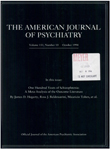Update on the dementia spectrum of depression
Abstract
OBJECTIVE: The primary focus of this review is to examine the usual dichotomy between depressive dementia as functional and reversible and degenerative dementia as organic and irreversible. METHOD: The authors propose viewing depression, cognitive impairment, and degenerative dementia as intersecting continua. They define five prototypical groups along these continua: 1) major depression without depressive dementia, 2) depressive dementia, 3) degenerative dementia without depression, 4) depression of degenerative dementia, and 5) independent co-occurrence of degenerative dementia and depression. Clinical, neuropsychological, and neurobiological studies comparing these groupings were identified by a computerized literature search covering the past 20 years. References were selected for review if they compared at least two groups. Degenerative dementia was limited to the Alzheimer type. RESULTS: No studies clearly included all five of the prototypical groups. There are methodological problems with each type of research reviewed, but the consensus of the research is that severe cognitive impairment of depression is associated with a variety of organic abnormalities. Depending on the length of follow-up, depressive dementia may not be as reversible as previously thought. CONCLUSIONS: The continuum viewpoint encourages longitudinal clinical follow-up for early detection and alleviation of incipient depressive and dementing symptoms. Hypotheses of overlapping pathophysiological mechanisms rather than differential diagnosis become an important research focus. The authors discuss three different types of relationships for future research: 1) interactions, 2) consequences of disease or treatment, and 3) necessary but not sufficient pathophysiology.
Access content
To read the fulltext, please use one of the options below to sign in or purchase access.- Personal login
- Institutional Login
- Sign in via OpenAthens
- Register for access
-
Please login/register if you wish to pair your device and check access availability.
Not a subscriber?
PsychiatryOnline subscription options offer access to the DSM-5 library, books, journals, CME, and patient resources. This all-in-one virtual library provides psychiatrists and mental health professionals with key resources for diagnosis, treatment, research, and professional development.
Need more help? PsychiatryOnline Customer Service may be reached by emailing [email protected] or by calling 800-368-5777 (in the U.S.) or 703-907-7322 (outside the U.S.).



